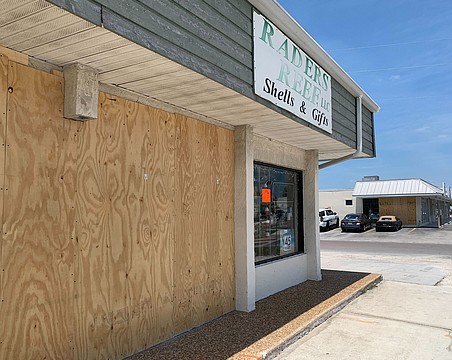Coffee Talk
Merger transformation
Industry slowdowns are often times to re-evaluate your business model and although the Gulf Coast real estate market is still moving fast, evidence of at least two companies revisiting their strategic is already emerging. There could be more.
Prudential Cascade Realty is joining Prudential Palms Realty. The 50-50 merger makes the fourth-largest real estate firm in Sarasota-Manatee county region significantly larger. Prudential Cascade was previously the fifth ranked real estate firm in the region with $285 million in closings in 2005. The new company, to be called Prudential Palms Realty, is projecting closings of $1 billion for 2006, making it the third largest Prudential franchise in Florida.
Prudential Palms' Scott Sosso will continue as president of the joint company, while Greg Reynolds and Kim Gilliland, managing partners of Prudential Cascade, will serve as senior vice president and vice president respectively.
"It worked perfectly; we have been having trouble finding qualified managers," Sosso says. On the reverse, Reynolds says Cascade was far more agent heavy. The joint company was estimated to save the two companies roughly $300,000 to $400,000 in office and overhead efficiencies with no layoffs.
Michael Saunders, owner of Michael Saunders & Co., the largest real estate firm in the two-county region, says she wouldn't be surprised if there were more real estate company mergers in the near future, but it was questionable who those companies would be, particularly because of the significantly smaller size and scale below the top four companies.
"It is not unusual to see mergers of franchises," Saunders says. "Today, to meet the needs of the consumer ... you have to be a full-service company. Unfortunately there has to be some scale to do that. I have five or six people just on the IT side. We have eight just for marketing. We will probably pay $1 million a year just on IT - not running the division - that's just on enhancements. A smaller company can't do that."
Saunders says she is always considering acquisitions, but that her company to this point has been grown organically because of the "culture gap" of merging two agencies.
"Even though these are two Prudentials, they are going to have very different cultures to meld," Saunders says.
Don't worry, feel happy
A new survey by the International Profit Associates Small Business Research Board shows that small business owners and executive managers are starting to feeling positive about the outlook for 2006. The survey showed a significant change in owner opinion that had been overwhelmingly pessimistic through most of 2005.
In the current survey, 49% predicted the economy would be better for the next twelve months compared to just 26% in the previous survey.
Forty percent of small business owners say they expected to increase hiring in 2006. This doubles the number from the October 2005. And 67% of small businesses predict their revenue will increase in 2006. At the same time, 56% said their revenue actually increased for all of 2005.
When asked which single issue will have the greatest impact on their business in 2006, the top concerns:
Economic conditions 27%
Energy/Fuel costs 13%
Finding quality employees 13%
Healthcare costs 11%
Taxes 11%
"A year ago, fuel costs were not even on the list of top issues for small businesses," says Gregg Steinberg, President of International Profit Associates. "Small businesses now say that it ranks with healthcare costs, finding quality employees and taxes."
Boyd Realty targeting Fortune 500?
Brenda Boyd May's new partner in her Manatee County real-estate company Boyd Realty has a decidedly corporate background.
Gregg Guinta has a resume more indicative of big-business finance than real estate. He served as regional chief financial officer for Pepsi Cola Bottling Group, treasurer for Banc Boston Trust Co. in New York and senior vice president of operations positions for the $1 billion human-resources outsourcing division Fidelity Human Resource Services and various other Fidelity companies.
In Bradenton, Guinta is expected to make the boutique firm more attractive to corporate executives, which could be particularly important to Boyd's commercial properties and investments.
Guinta says he always planned to work in Bradenton, but his initial plan had been to work primarily on investments and wealth management.
"But talking to Brenda, it seemed there was a natural overlap," Guinta says. "My role will really be about driving the economics to a project. This will be about offering financing alternatives at the start of the project."
Colliers Arnold bulks up its Fort Myers office
The booming commercial real estate market in Fort Myers is not a secret anymore and Clearwater-based Colliers Arnold is doubling its staff there.
The commercial real estate brokerage firm recently hired veteran brokers Jim Garinger, Karen Johnson-Crowther and Jim Tamblyn, all formerly with VIP Commercial-TCN Worldwide in Fort Myers.
"Southwest Florida is our best opportunity for expansion in our market," says J. Patrick Duffy, president of Colliers Arnold. "Eventually, we'll open an office in Naples."
Colliers Arnold has had an office in Fort Myers since 1996 headed by managing director Karl Lippek. Until now, the office has handled mostly retail and land transactions and Duffy says the company plans to expand into office and industrial deals in Lee and Collier counties. "We've got more work than people to do it," he says.
Colliers Arnold's Fort Myers office negotiated 76 commercial property leases and sales transactions worth a total of more than $128 million in 2005 and Duffy says he expects to double those figures in 2006.
In addition to Clearwater and Fort Myers, Colliers Arnold has offices in Tampa and Orlando. Duffy says the company handled a total of $1.3 billion worth of transactions last year.
Speaking of hot markets...
The figures coming out of Lee County Property Appraiser Ken Wilkinson's office show just how frenzied the real estate market was last year.
In 2005, there were 174,908 property sales in Lee County. Contrast that figure with 2003, which saw 90,000 sales. "It's killing me," Wilkinson says. "It's almost doubled in two years."
What's even more stunning is that Wilkinson says that there are 585,000 separate land parcels in Lee County. If you consider that some transactions involve multiple parcels, it's safe to say that at least 30% of the parcels changed hands last year.
Buying in, selling out
If your private company has a problem, it is unwise to leave early investors or later buyers in the dark.
That piece of advice came from Tampa investment banker John H. Hill Jr. during a panel discussion of the latest trends in entrepreneurial finance at the Florida Venture Forum's recent annual conference.
"We all turn into perfume salesmen," says Jonathan E. Cole, a partner in the South Florida law offices of Edwards Angell Palmer & Dodge LLP.
But Hill, senior managing director at Hyde Park Capital Partners LLC, says funding sources dislike surprises during due diligence. Surprises can scuttle months of work on a term sheet, he says.
Grant Thornton LLP certified public accountant Mike Ryan agrees – and he should know. "My job is to find out where the perfume is and where the pig is," jokes Ryan, who represents corporate buyers in the Southeast.
David C. Shobe, a shareholder with the Tampa law office of Fowler White Boggs Banker PA, says entrepreneurs looking for a big infusion of capital should know their backer's exit strategy and be comfortable with it.
"This is the only chance you have to pick your parents," says Shobe. "But you're not going to be a teenager forever."
Buyout and private-equity firms have a lot of cash from their investors right now, according to Hill. These financial buyers are forcing up prices for venture-backed companies. But strategic buyers, those operating in the same industry as the company for sale, still complete 85% of the deals, he says.
Hill has noticed more foreigners scouting for Southeast takeover candidates. Hyde Park Capital has sold two companies in recent months to buyers from Japan and the United Kingdom.
Whether an entrepreneur is selling a piece of the company or the whole thing, Cole says, all buyers will pay a premium for good management. The only exception might be in life sciences. "Either the molecule works," he says, "or it doesn't."
Private Capital Management's 'difficult' year
Bruce Sherman, chief executive officer of Naples-based Private Capital Management, isn't used to losing.
But 2005 was not his money management's year to shine.
PCM's portfolios lost nearly 1%. That contrasts with a gain of nearly 5% for the Standard & Poor's 500-stock index.
"It was a difficult year," Sherman says in a letter to shareholders, citing the firm's avoidance of oil and gas stocks as a main reason for underperformance relative to the index.
Sherman also blamed hurricanes for impacting the firm's holdings in casino and hospital stocks. The firm manages $31 billion in assets.
PCM and Sherman shook up the newspaper world last year by calling on the management of Knight Ridder to seek a buyer for the newspaper publisher. PCM is Knight Ridder's largest stockholder.
Despite newspaper stocks' underperformance, Sherman remains bullish on the industry. "From a fundamental standpoint, the newspaper companies in your portfolio are moderately leveraged, produce massive free cash flow and yield operating margins approaching those of the best software or pharmaceutical companies," he tells shareholders. Besides Knight Ridder, PCM's newspaper holdings include McClatchy Co., Belo Corp., Lee Enterprises, The New York Times, Gannett Co. and Tribune Co.
Still, investors should put PCM's 2005 loss in perspective. The firm's portfolios have returned an annualized 20% return over the last 10 years versus 9% for the S&P 500.
Calendar
Feb. 22 - Manatee Community College will hold noncredit business writing class from 5:30 to 9:30 p.m. at the Bradenton office, 5840 26th St. West. The fee is $92. Call (941) 752-5203.
Feb. 22 - The Economic Development Corporation of Sarasota County and the Florida West Coast Resource Conservation and Development Council will host the "Natural Capitalism," a seminar presented by the Rocky Mountain Institute from 8:30 a.m. to 12:30 p.m. at the Manatee Community College Center for Innovation and Technology, 7131 Professional Parkway E. in Lakewood Ranch. The seminar will focus on how to integrate smart growth and sustainable economic development, and strategies for building stronger local economies. E-mail [email protected] or (941) 309-1200, Ext. 203.





